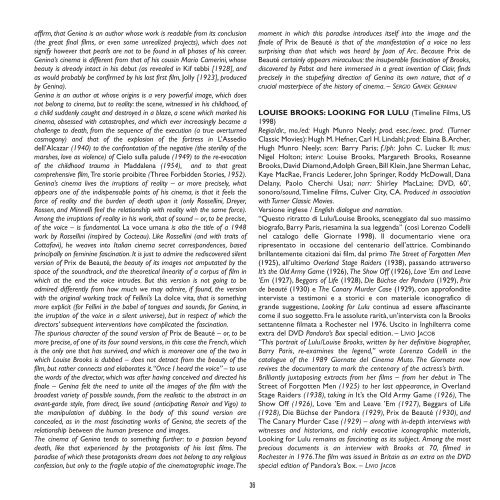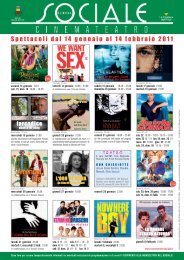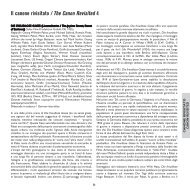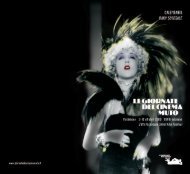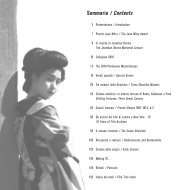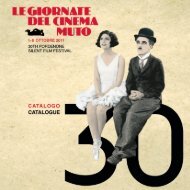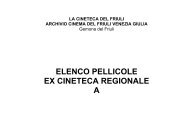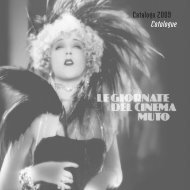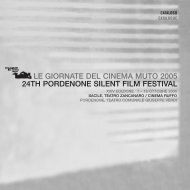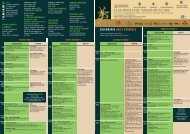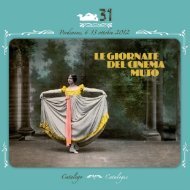Le Giornate del Cinema Muto 2006 Sommario / Contents
Le Giornate del Cinema Muto 2006 Sommario / Contents
Le Giornate del Cinema Muto 2006 Sommario / Contents
Create successful ePaper yourself
Turn your PDF publications into a flip-book with our unique Google optimized e-Paper software.
affirm, that Genina is an author whose work is readable from its conclusion<br />
(the great final films, or even some unrealized projects), which does not<br />
signify however that pearls are not to be found in all phases of his career.<br />
Genina’s cinema is different from that of his cousin Mario Camerini, whose<br />
beauty is already intact in his debut (as revealed in Kif tebbi [1928], and<br />
as would probably be confirmed by his lost first film, Jolly [1923], produced<br />
by Genina).<br />
Genina is an author at whose origins is a very powerful image, which does<br />
not belong to cinema, but to reality: the scene, witnessed in his childhood, of<br />
a child suddenly caught and destroyed in a blaze, a scene which marked his<br />
cinema, obsessed with catastrophes, and which ever increasingly became a<br />
challenge to death, from the sequence of the execution (a true overturned<br />
cosmogony) and that of the explosion of the fortress in L’Assedio<br />
<strong>del</strong>l’Alcazar (1940) to the confrontation of the negative (the sterility of the<br />
marshes, love as violence) of Cielo sulla palude (1949) to the re-evocation<br />
of the childhood trauma in Maddalena (1954), and to that great<br />
comprehensive film, Tre storie proibite (Three Forbidden Stories, 1952).<br />
Genina’s cinema lives the irruptions of reality – or more precisely, what<br />
appears one of the indispensable points of his cinema, is that it feels the<br />
force of reality and the burden of death upon it (only Rossellini, Dreyer,<br />
Rossen, and Minnelli feel the relationship with reality with the same force).<br />
Among the irruptions of reality in his work, that of sound – or, to be precise,<br />
of the voice – is fundamental. La voce umana is also the title of a 1948<br />
work by Rossellini (inspired by Cocteau). Like Rossellini (and with traits of<br />
Cottafavi), he weaves into Italian cinema secret correspondences, based<br />
principally on feminine fascination. It is just to admire the rediscovered silent<br />
version of Prix de Beauté, the beauty of its images not amputated by the<br />
space of the soundtrack, and the theoretical linearity of a corpus of film in<br />
which at the end the voice intrudes. But this version is not going to be<br />
admired differently from how much we may admire, if found, the version<br />
with the original working track of Fellini’s La dolce vita, that is something<br />
more explicit (for Fellini in the babel of tongues and sounds, for Genina, in<br />
the irruption of the voice in a silent universe), but in respect of which the<br />
directors’ subsequent interventions have complicated the fascination.<br />
The spurious character of the sound version of Prix de Beauté – or, to be<br />
more precise, of one of its four sound versions, in this case the French, which<br />
is the only one that has survived, and which is moreover one of the two in<br />
which Louise Brooks is dubbed – does not detract from the beauty of the<br />
film, but rather connects and elaborates it.“Once I heard the voice” – to use<br />
the words of the director, which was after having conceived and directed his<br />
finale – Genina felt the need to unite all the images of the film with the<br />
broadest variety of possible sounds, from the realistic to the abstract in an<br />
avant-garde style, from direct, live sound (anticipating Renoir and Vigo) to<br />
the manipulation of dubbing. In the body of this sound version are<br />
concealed, as in the most fascinating works of Genina, the secrets of the<br />
relationship between the human presence and images.<br />
The cinema of Genina tends to something further: to a passion beyond<br />
death, like that experienced by the protagonists of his last films. The<br />
paradise of which these protagonists dream does not belong to any religious<br />
confession, but only to the fragile utopia of the cinematographic image.The<br />
36<br />
moment in which this paradise introduces itself into the image and the<br />
finale of Prix de Beauté is that of the manifestation of a voice no less<br />
surprising than that which was heard by Joan of Arc. Because Prix de<br />
Beauté certainly appears miraculous: the insuperable fascination of Brooks,<br />
discovered by Pabst and here immersed in a great invention of Clair, finds<br />
precisely in the stupefying direction of Genina its own nature, that of a<br />
crucial masterpiece of the history of cinema. – SERGIO GRMEK GERMANI<br />
LOUISE BROOKS: LOOKING FOR LULU (Timeline Films, US<br />
1998)<br />
Regia/dir., mo./ed: Hugh Munro Neely; prod. esec./exec. prod. (Turner<br />
Classic Movies): Hugh M. Hefner, Carl H. Lindahl; prod: Elaina B.Archer,<br />
Hugh Munro Neely; scen: Barry Paris; f./ph: John C. Lucker II; mus:<br />
Nigel Holton; interv: Louise Brooks, Margareth Brooks, Roseanne<br />
Brooks, David Diamond,Adolph Green, Bill Klein, Jane Sherman <strong>Le</strong>hac,<br />
Kaye MacRae, Francis <strong>Le</strong>derer, John Springer, Roddy McDowall, Dana<br />
Delany, Paolo Cherchi Usai; narr: Shirley MacLaine; DVD, 60’,<br />
sonoro/sound, Timeline Films, Culver City, CA. Produced in association<br />
with Turner Classic Movies.<br />
Versione inglese / English dialogue and narration.<br />
“Questo ritratto di Lulu/Louise Brooks, sceneggiato dal suo massimo<br />
biografo, Barry Paris, riesamina la sua leggenda” (così Lorenzo Co<strong>del</strong>li<br />
nel catalogo <strong>del</strong>le <strong>Giornate</strong> 1998). Il documentario viene ora<br />
ripresentato in occasione <strong>del</strong> centenario <strong>del</strong>l’attrice. Combinando<br />
brillantemente citazioni dai film, dal primo The Street of Forgotten Men<br />
(1925), all’ultimo Overland Stage Raiders (1938), passando attraverso<br />
It’s the Old Army Game (1926), The Show Off (1926), Love ’Em and <strong>Le</strong>ave<br />
’Em (1927), Beggars of Life (1928), Die Büchse der Pandora (1929), Prix<br />
de beauté (1930) e The Canary Murder Case (1929), con approfondite<br />
interviste a testimoni e a storici e con materiale iconografico di<br />
grande suggestione, Looking for Lulu continua ad essere affascinante<br />
come il suo soggetto. Fra le assolute rarità, un’intervista con la Brooks<br />
settantenne filmata a Rochester nel 1976. Uscito in Inghilterra come<br />
extra <strong>del</strong> DVD Pandora’s Box special edition. – LIVIO JACOB<br />
“This portrait of Lulu/Louise Brooks, written by her definitive biographer,<br />
Barry Paris, re-examines the legend,” wrote Lorenzo Co<strong>del</strong>li in the<br />
catalogue of the 1989 <strong>Giornate</strong> <strong>del</strong> <strong>Cinema</strong> <strong>Muto</strong>. The <strong>Giornate</strong> now<br />
revives the documentary to mark the centenary of the actress’s birth.<br />
Brilliantly juxtaposing extracts from her films – from her debut in The<br />
Street of Forgotten Men (1925) to her last appearance, in Overland<br />
Stage Raiders (1938), taking in It’s the Old Army Game (1926), The<br />
Show Off (1926), Love ’Em and <strong>Le</strong>ave ’Em (1927), Beggars of Life<br />
(1928), Die Büchse der Pandora (1929), Prix de Beauté (1930), and<br />
The Canary Murder Case (1929) – along with in-depth interviews with<br />
witnesses and historians, and richly evocative iconographic materials,<br />
Looking for Lulu remains as fascinating as its subject. Among the most<br />
precious documents is an interview with Brooks at 70, filmed in<br />
Rochester in 1976.The film was issued in Britain as an extra on the DVD<br />
special edition of Pandora’s Box. – LIVIO JACOB


